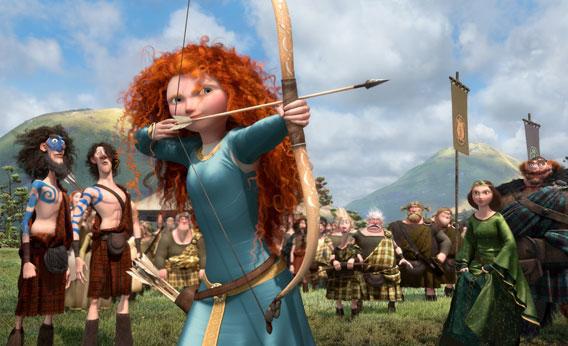The general disappointment with Pixar’s new movie Brave, which opens Friday, began long before even a trailer was released. The complaint was focused on the lead character Merida, who Pixar proudly announced would be its first girl heroine. After enduring some public and critical outcry over the lack of female leads, the company, known for daring to foist extreme dystopian landscapes and despot teddy bears on the world’s children, was now making its big feminist statement with a … princess. Peggy Orenstein was already mad about it in her 2011 book Cinderella Ate My Daughter and now she is even madder: “It still irritates me that a team as creative as Pixar’s, which has imagined so many extraordinary male characters, can’t imagine a female protagonist unless she’s a bloody princess” she wrote last week. Jezebel’s review, titled “Pixar Isn’t Even Trying,” concluded that “Maybe it really is a boy’s club after all.”
I finally saw a preview last night with my 11-year-old daughter and I have to say, the movie has the lady fingerprints all over it (Brenda Chapman wrote and co-directed) and breaks ground in its own way. For one thing, there are all the male characters in the movie. If a boy’s club made this movie than the boy’s club was drunk or bamboozled. The men in Brave are all oafs, idiots, or sissies; not a shred of intelligence or heroism among them. Merida’s father checks all the sitcom doltish dad stereotypes: He is inarticulate, gives bad advice, and knocks down everything in his path; in fact, central plot developments depend on his stupidity. In the noncartoon version, Merida’s three preposterous suitors would be played by Jonah Hill, Jay Baruchel and Andy Samberg. At one point, a noble warrior moons everyone, at another, the whole crew of them walks around pantsless. All the wisdom and bravery comes entirely from Merida—a rebellious, yes, princess—and her mother, the Queen.
The radical question this movie takes on is women and power. Not power as in leadership—t’s perfectly clear that the Queen is the only legitimate leader—but raw physical power, edging over into violence. In her essay “Throwing Like a Girl,” philosopher Iris Marion Young argues that the early-life failure of girls to use their bodies in lateral space or to throw their whole weight behind physical tasks limits their imagination and sense of potential. These are the kinds of limitations Merida takes on in an early exhilarating scene when she rides through the forest shooting everything in her path. In another archery scene, Merida bursts through her constricting dress, Hulk-like. When the Queen loses patience with Merida’s rebellions she shoves her daughter against the wall, which must be the only incidence of mom-on-daughter violence in a Disney-sponsored cartoon. (In the toddler flashback, the Queen tells Merida “I could eat you,” hint hint.)
There is a general sense in the movie that Merida channels pure force, not just because of her wild red hair but also because of the very way she moves. She is not a giant clumsy boor like the male warriors, she fights precisely and effectively. In the normal course of a princess rebellion story, Merida would balk at her expected duties and the kingdom would learn that young people—and especially young women—should be free to choose their fate. That happens in Brave but not before a weird, long Freudian interlude. I fear spoiling the plot twist but in this digression is where the movie really takes on the alarming spectacle of raw female violence and all its scary implications. (Skip to the next paragraph if you don’t want anything spoiled.) In original fairy tales, bears are a mortal threat to girls; in the original Goldilocks she is torn apart and eaten—her comeuppance for wandering freely in the forest. In Brave females and bears merge in a whole new strange way.
When the Queen explains to Merida why she can’t be rebellious she lists not just generic duties to the kingdom but personality traits which a proper princess should have: compassion, patience, caution, cleanliness, a yearning for perfection. This could very well describe the average ambitious college girl. People often ask why there aren’t more women in power. The real answer is that even though women are more successful than ever these days, we hold on to a cultural ambivalence about women with real power. Women can be competent, perfect, compassionate, but not quite dominant.
I think this is partly because we associate dominance with physical force. In the hunter/gatherer origin myth, men control the resources because they have more upper body strength. And even though upper body strength is irrelevant now, we haven’t been able to let go of the myth—until now, when it seems a shift is afoot. Pop culture is reflecting our anxieties about that shift, with ever more uncomfortable roles for women who fight and kill: Hanna, Salt, The Hunger Games, The Girl With the Dragon Tattoo, and now Brave.
